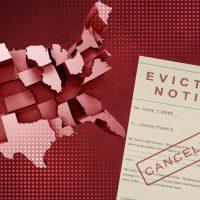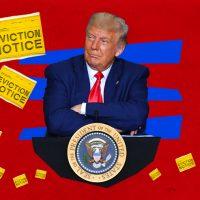Three days after a state agency published an order extending the eviction moratorium through Dec. 31, it flip-flopped, marking the latest mixup in New York’s eviction policy saga.
The Office of Disability and Temporary Assistance, which administers state benefit programs, sent the initial directive on Monday. The letter — which caught recipients off guard — announced that because of the federal eviction moratorium, “the provisions of Judge [Lawrence] Marks’ Administrative Order have been extended to prevent evictions through December 31, 2020.”
That was news to the Office of Court Administration, where Chief Administrative Judge Marks presides. The office responded, saying there had been “no changes” to the state eviction moratorium, which expires Oct.1, and called ODTA’s misstep an “apparent misinterpretation.”
A spokesperson for the Office of Disability and Temporary Assistance said the guidance had been posted in error, has been taken down and is now being clarified. Gov. Andrew Cuomo’s office did not respond to a request for comment.
Read more



During an August joint legislative hearing on the impact of coronavirus on the courts, Judge Marks said he was still concerned about a “mad rush of eviction cases.” But it was Judge Daniele Chinea, president of the Housing Court Judges Association, who made it clear to lawmakers that those judges are tired of adjudicating a controversial policy item.
“We need you, the legislature and the executive [branch] to make a plan,” Chinea said. “This is a natural disaster, a global pandemic, the effects ongoing and far-reaching. Whose struggle shall I continue — or alleviate — at the pain of the other?”
Instead of the plan that Chinea requested on behalf of the 50 housing court judges she represents, the OTDA’s bungled directive this week brought confusion. Property owners have criticized what they call sometimes contradictory and bewildering orders from different branches of the state government.
Even more surprising was the most sweeping eviction moratorium yet — which came from the federal government, not New York state.
Earlier this month, the Centers for Disease Control announced restrictions on residential evictions through the end of the year, after President Trump directed the agencies to consider such a move. Tenant advocates have criticized the moratorium because it does not prevent holdover evictions, or evictions via non-renewal of lease, while landlords have said it does nothing to help them collect rent.
In New York, eviction protections are relatively strong compared to other states. In Kentucky, for example, a nuisance ordinance law allows landlords to file evictions after police have visited a property three times, for any reason.
In 16 cities across the U.S., there was a sharp decline in filings after the federal eviction limits were implemented, one study found.
